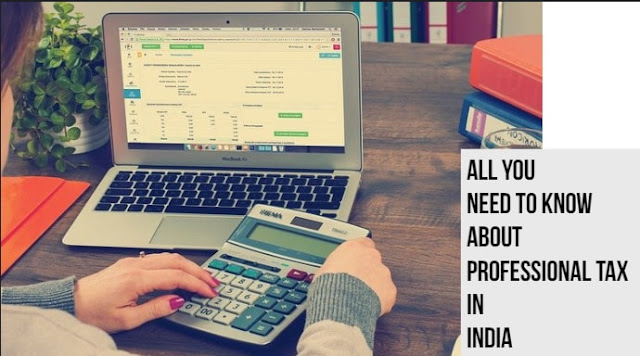This article has been written by Sugandha Nagariya, a law student, pursuing BLS LLB at Government Law College, Mumbai and an intern at WinSavvy.
There are various types of taxes which are paid either to the central or the state government and one such tax is the “Professional Tax”.
You might have noticed it in your payslip but please don’t confuse it with income tax, as both are different . Now have you wondered what is it or how it is deducted and may be to whom we are paying this tax every month?
So here are your answers!!
What is a Professional Tax?
A professional tax is an indirect tax which is paid to the state government in exchange of the services provided by them to carry out your profession and also used for bettering the services for professionals in the state. It is considered to be a source of revenue for the government.
The tax is deducted from the income you earn through employment and the employer also deducts it from your salary each month. The tax is not imposed by all the states.
The states that impose the professional are as follows:
Punjab, Uttar Pradesh, Karnataka, Bihar, West Bengal, Andhra Pradesh, Telangana, Maharashtra, Tamil Nadu, Gujarat, Assam, Kerala, Meghalaya, Odisha, Tripura, Madhya Pradesh, Jharkhand and Sikkim.
However, some states like Delhi, Uttar Pradesh, Haryana, Andaman and Nicobar, Goa do not impose profession tax.
Professional tax was introduced in 1949 and was revised in 1988.At the time of the introduction, the maximum annual limit of professional tax was Rs 250. However, by 1988, this limit had increased to Rs. 2,500 per individual. Three decades on, the limit hasn’t changed but can be changed in the coming future.
Related: This article is part of the Business in India series. Check out other articles of this series-
- What You Need to Know Before Investing in or Setting Up a Business in India
- Memorandum – The Most Important Thing, When Starting a Company, and How to Frame it
Persons responsible to pay Professional Tax
As per the Profession, Trade, Callings and Employment Act 2000, all professionals who earn a monthly income above a certain level are liable to pay profession tax.

- In case of employee or wage earners, the employer is the one responsible to deduct the professional tax from the income or wage of the employees and the same is to be deposited to the State Government.
- Professional tax deducted from the salary of employee is to be allowed under section 16(iii) of Income Tax Act, 1961 at the time of computing income under the head salary
- A professional carrying out a profession such as a chartered accountant, company secretary, lawyer, doctor, engineer etc. is required to pay the tax according to the monetary threshold if any, provided by the state government.
- Corporates, partnership firms, sole proprietorship etc. carrying on a trade are responsible to pay the tax to their respective state government.
- Persons who are carrying on freelancing business without any employees are also required to pay it.
- In case you do not work in a company or have any employer, but still you earn an income, then it is your responsibility to pay the tax to the respective government by filling a special form.
Deduction of Tax
Professional tax is applicable as per the constitution of India under Article 276(2) which says that –
there shall be levied and collected a tax on professions, trades, callings and employments, in accordance with the provisions of this Act. Every person engaged in any profession, trade, calling or employment and falling under one or the other of the classes mentioned in the second column of the Schedule shall be liable to pay to the State Government tax at the rate mentioned against the class of such persons in the third column of the said Schedule. Provided that entry 23 in the Schedule shall apply only to such classes of persons as may be specified by the State Government by notification from time to time.
Professional tax calculation is based on predetermined tax slabs by respective state government on the basis of salary and income earned by different set of people.
Different states have different rules regarding the tax slabs and they are modified on a regular basis. Profession tax is usually collected in 11 equal deductions and is usually Rs 200 per month.
The maximum amount of tax to be imposed by the State Government should not be more than INR 2,500. In some cases, the payment of tax is fixed by the government.
In case of a company, directors of the company, partnerships, individual partners, self- employed or owners of any business undertaken in the state, the tax paid is dependent upon their gross turnover in the preceding year and on the gross salary for that month in, case of employees.
- Let’s consider the example of an employee whose salary per month is Rs. 70,000. The gross salary is calculated by deducting EPF, gratuity, leave deduction and loan repayments to the company from the salary amount. The balance you will get is the gross salary.
Let’s consider for this example that after deductions the gross salary comes to Rs. 60,000. As a business owner, you will need to deduct professional tax on Rs. 60,000. As per the professional tax rules in the state of Maharashtra, as a business owner you are required to deduct Rs.200 towards professional tax, except in the month of March, when the deduction will be Rs.300
- Another example is of a factory in the state of Uttar Pradesh, owner of a factory has to pay professional tax only if the preceding year turnover is greater than 6 lac rupees.
It is also advisable to certify the profession tax from a Chartered accountant before paying. Before you hire someone to look into your legal or tax related affairs, make sure to check out how to do it legally, that is via a power of attorney.
Payment and Registration
Note: This is the part where you execute, so read slowly and carefully.
Professional tax is collected by the Commercial Tax Department of the state government. The commercial tax department of the respective states collects it which finally reaches the fund of Municipality Corporation.

In order to pay the tax the company or the employer is required to obtain 2 types of certificates within 30 days of hiring the employees in your company and if the company does not get the registration certificate within 30 days then it is liable to pay the penalty.
The Two Types of Certificate are:
- The professional tax Registration Certificate [PTRC]-Every employer in specific states is required to deduct taxes from salary when paid to one or more employees and the payment made exceeds a certain limit set up by the state government which is further deposit to the state government, such entities are required to obtain registration certificate.
- Profession tax Enrollment Certificate [PTEC]- When person is employed in profession by two or more employers and is getting salary exceeding a certain limit set up by the state government but employer is not deducting professional tax then the individual needs to get enrolment certificate from authority.
States have made the registration of professional tax both online as well as offline. You can either visit the state government tax website and select the respective link from there or you can also visit the nearest district sales tax office to complete the registration formalities for which you will need to submit some business related documents, so it is necessary to make a list of the documents required before visiting the government office.
- In case the place of work is in different states or places, application for the Registration Certificate has to be done separately to each authority with respect to the place of work coming under that particular state .
- If an employer has employed more than 20 employees, than he is required to make the payment of tax within 15 days from the end of the month. However, if an employer has less than 20 employees in his company, then he is required to pay quarterly (i.e. by the 15th of next month from the end of the quarter).
- The Indian professionals employed by a foreign diplomatic office or an embassy are required to pay the tax by themselves as these offices need not to get a certificate of registration.
- Professional tax payments can either be made online or offline by visiting the local state tax office. Each state collects professional tax though net banking or you can pay the tax through a challan at the nearest bank that collects it.
Documents Required For Registration
FOR COMPANIES
- PAN card of Company: PAN card must be attested by the Director of the Company.
- Certificate of Incorporation of the Company.
- Memorandum of Association and Articles of Association of the company.
- Bank details of the Company: Cancelled cheque and bank statement.
- List of Directors.
- Passport size Photographs of all Directors.
- Documents of the Directors: PAN card + I.D. Proof.
- Aadhar Card of the Company.
- Board Resolution passed by the Directors of the Company authorizing Professional Tax Registration and enrollment.
- Attendance Register & Salary Register.
- Authorization Letter for obtaining user I.D. and Password of Professional Tax Department.
FOR LLP/PARTNERSHIP
- PAN card of LLP/Partnership Firm: PAN card must be attested by the names of the partner LLP or any partner of Partnership firm.
- Certificate of Incorporation of LLP or Registration of Partnership firm.
- LLP Agreement / Partnership Deed.
- Bank details of LLP/Partnership Firm: Cancelled cheque and bank statement.
- List of Partners.
- Passport size Photographs of all Partners.
- Documents of the Partner: PAN card + I.D. Proof.
- Aadhar Card of the Partners.
- Partners consent for application to register under the Professional Tax beforehand.
- Attendance Register & Salary Register.
- Authorization Letter for obtaining user I.D. and Password of Professional Tax Department.
FOR INDIVIDUAL
- PAN card of Proprietor, self-attested.
- Premises proof of individual Proprietorship.
- Bank details of Proprietorship: Cancelled cheque and bank statement.
- Passport size Photographs of the Proprietor.
- Documents of the Proprietor: PAN card + I.D.
- Aadhar Card of the Proprietor.
- Attendance Register & Salary Register.
- Authorization Letter for obtaining user I.D. and Password of Professional Tax Department.
Who All Are Exempted From the Payment Of Professional Tax
Professional tax is imposed subject to exemption provided by respective State to certain category of people which are as follows:
- Parents of children suffering from permanent disability or mental disability.
- Members of the forces as defined in the Army Act, 1950, the Air Force Act, 1950 and the Navy Act, 1957 including members of auxiliary forces or reservists, serving in the state.
- Badli workers working in the textile industry.
- An individual suffering from a permanent physical disability (includes blindness also).
- Women exclusively engaged as agent under the Mahila Pradhan Kshetriya Bachat Yojana or Director of Small Savings.
- Parents or guardians of individuals with mental disability.
- Individuals, above 65 years of age.
Penalty For Non-Compliance
- In case you have failed to obtain or delay in obtaining a Registration Certificate a penalty of Rs 5/- is imposed.
- In case the Employer has not paid the tax than a penalty which is 2% of the amount of the tax is paid.
- In case of late payment of the tax of their employees by the employer, leads to a penalty which is 10% of the amount of the tax.
- In case of late filing of returns, a penalty of Rs. 1000 per return will be imposed and if you have filed the return after due date in 1 month. After 1 month, a penalty of Rs. 2000 will be imposed.
- If the information provided at the time of enrolment of the certificate is found to be incorrect than a penalty of three times of the tax amount due is imposed.
- In some cases also due to non-deposition of the tax may lead to confiscation of the assets, and in serious matters prosecution can also file a case against the defaulter.
Note: Different states have their different rules for non- compliance
Different Tax Slab Rates in Different States
1) Andhra Pradesh
| Monthly salary | Tax (Per Month) |
| Upto 15000 | Nil |
| 15001 to 20000 | 150 |
| Above 20,000 | 200 |
2) Assam
| Monthly salary | Tax (Per Month) |
| Upto 10000 | Nil |
| 10000 to 15000 | 150 |
| 15001 to 24999 | 180 |
| 25000 and above | 208 |
3) Bihar
| Monthly salary | Tax (Per Month) |
| Upto 25000 | Nil |
| 25001 to 41666 | 83.33 |
| 41667 to 83333 | 166.67 |
| 83334 and above | 208.33 |
4) Goa
| Monthly salary | Tax (Per Month) |
| Upto 15000 | Nil |
| 15001 to 25000 | 150 |
| 25001 and above | 200 |
5) Gujarat
| Monthly salary | Tax (Per Month) |
| Upto 6000 | Nil |
| 6000 to 9000 | 80 |
| 9000 to 12000 | 150 |
| 12000 and above | 200 |
6) Jharkhand
| Monthly salary | Tax (Per Month) |
| Upto 25000 | Nil |
| 25001 to 41666 | 100 |
| 41667 to 66666 | 150 |
| 66667 to 83333 | 175 |
| 83334 and above | 208 (212 in February) |
7) Karnataka
| Monthly salary | Tax (Per Month) |
| Up to 15,000 | NIL |
| More than 15,000 | 200 |
8) Kerala
| Monthly salary | Tax (Half Yearly) |
| Upto 1999 | Nil |
| 2000 to 2999 | 120 |
| 3000 to 4999 | 180 |
| 5000 to 7499 | 300 |
| 7500 to 12499 | 600 |
| 12500 to 16666 | 750 |
| 16667 to 20833 | 1000 |
| 20834 and above | 1250 |
9) Madhya Pradesh
| Annual salary | Tax (Per Month) |
| Upto 1.5 Lakhs | Nil |
| 1.5 lakhs to 1.8 lakhs | 125 |
| 1.8 Lakhs and above | 208 (212 for February) |
10) Maharashtra
| Monthly salary | Tax (Per Month) |
| Upto 7500 for Men | NIL |
| Upto 10000 for Women | NIL |
| 7500 to 10000 | 175 |
| 10000 and above | 200 (February-300) |
11) Meghalaya
| Annual salary | Tax (Annual) |
| Upto 50000 | Nil |
| 50001 to 75000 | 200 |
| 75001 to 100000 | 300 |
| 100001 to 150000 | 500 |
| 150001 to 200000 | 750 |
| 200001 to 250000 | 1000 |
| 250001 to 300000 | 1250 |
| 300001 to 350000 | 1500 |
| 350001 to 400000 | 1800 |
| 400001 to 450000 | 2100 |
| 450001 to 500000 | 2400 |
| 500001 and above | 2500 |
12) Orissa
| Monthly salary | Tax (Per Month) |
| Upto 5000 | Nil |
| 5001 to 6000 | 30 |
| 6001 to 8000 | 50 |
| 8001 to 10000 | 75 |
| 10001 to 15000 | 100 |
| 15001 to 20000 | 150 |
| Above 20000 | 200 |
13) Sikkim
| Monthly salary | Tax (Per Month) |
| Upto 20000 | Nil |
| 15001 to 30000 | 125 |
| 30001 to 40000 | 150 |
| 40001 and more | 200 |
14) Tamil Nadu
| Half Yearly salary | Tax ( Per 6 Month) |
| Upto 21000 | Nil |
| 21001 to 30000 | 100 |
| 30001 to 45000 | 235 |
| 40001 to 60000 | 510 |
| 60001 to 75000 | 760 |
| 75001 and above | 1095 |
15) Telangana
| Monthly salary | Tax (Per Month) |
| Upto 15000 | Nil |
| 15001 to 20000 | 150 |
| 20001 and above | 200 |
16) Tripura
| Monthly salary | Tax (Half Yearly) |
| Upto 5000 | Nil |
| 5001 to 7000 | 420 |
| 7001 to 9000 | 720 |
| 9001 to 12000 | 840 |
| 12000 to 15000 | 1140 |
| 15001 and above | 1248 |
17) West Bengal
| Monthly salary | Tax (Per Month) |
| Upto 8500 | Nil |
| 8501 to 10000 | 90 |
| 10001 to 15000 | 110 |
| 15001 to 25000 | 130 |
| 25001 to 40000 | 150 |
| More than 40000 | 200 |
Note: Different rates are also announced at regular intervals for various professional and business.
Conclusion
Things that are kept in mind in the aspect of PROFESSIONAL TAX are:
- It is mandatory to pay the tax.
- The tax payer is eligible for income tax deduction for the payment of professional taxi which means the amount can be shown as a deduction from your salary in your income tax return.
- Whether your state imposes the tax or not.
- Different states levy different rates of professional taxes depending on tax slabs in that state.
- The rules governing the professional tax may vary over time and it is advisable to check the current rules.
- A unique number is allotted by state government to every person applying for the registration certificate.
- Once paid, the professional tax cannot be refunded.
Have any questions? Leave it down in the comments and we’ll get back to you.
For any queries or help with your startup, feel free to book a free consultation with us. You may also check out our list of services if you need any help with your business efforts.
Read next:
- 70 Startup Mistakes Which Can Sabotage Your Business
- All You Need to Know about Appointing Directors for Your Company in India




















